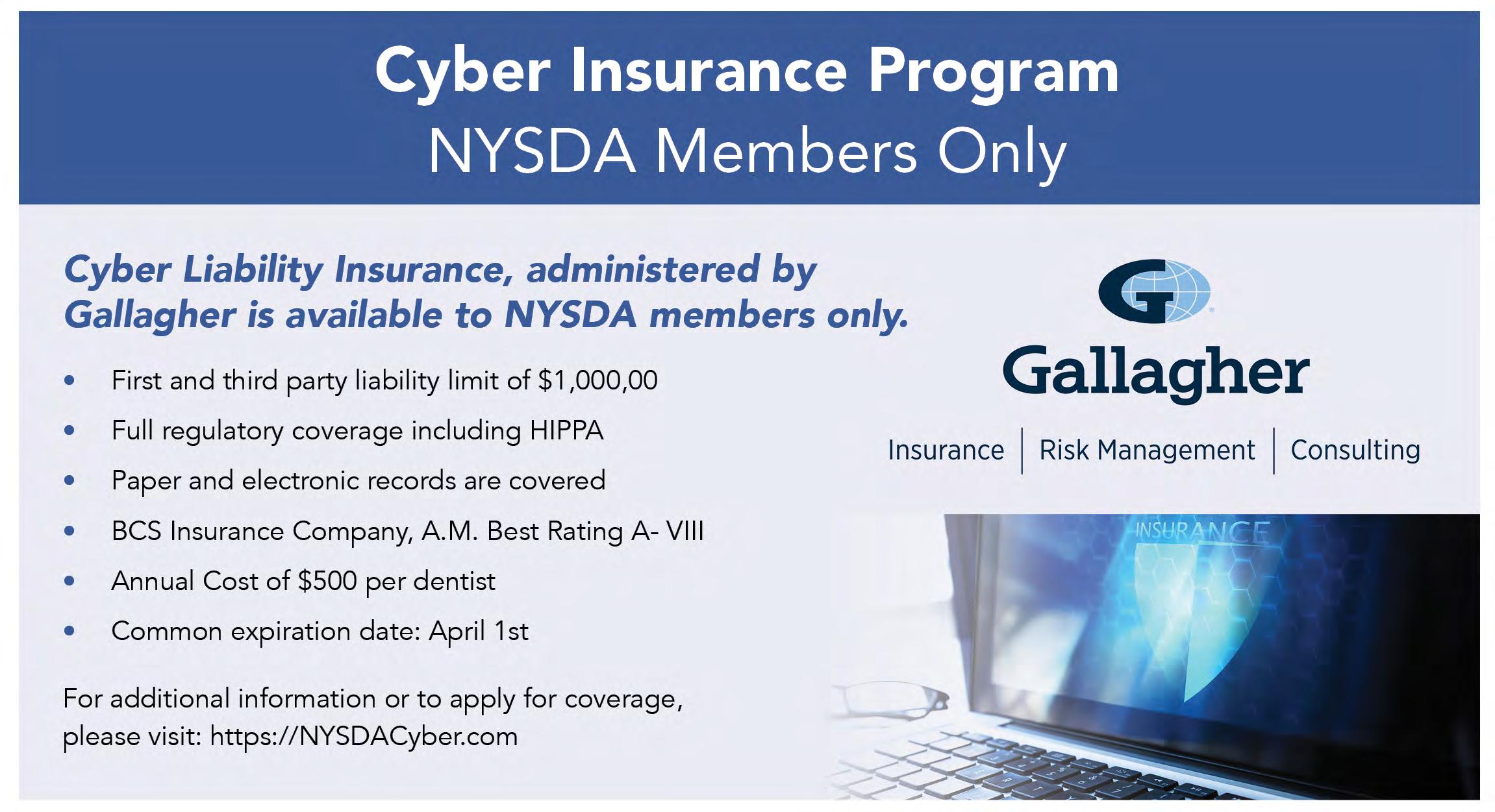
6 minute read
Why Your Dental Practice Needs Cybersecurity Insurance (But Shouldn’t Stop There)
Why Your Dental Practice Needs Cybersecurity
Gary Salman
Data breaches and cyberattacks have become an unfortunate reality for businesses of all sizes, and dental practices are no exception. With sensitive patient data at the heart of your operations, protecting your digital infrastructure should be a top priority. Cybersecurity insurance is a powerful tool in your defense arsenal, offering a safety net in the aftermath of a breach. But while it’s essential, relying solely on insurance leaves your practice exposed.
To truly safeguard patient data and avoid costly disruptions, dental offices must pair cybersecurity insurance with proactive risk management, industry-specific cybersecurity strategies and robust IT practices. This article highlights why cybersecurity insurance is a must-have, but also why it’s not enough on its own.
What Cybersecurity Insurance Covers
Cybersecurity insurance (or cyber liability insurance) is designed to shield businesses from the financial fallout of a cyberattack. Here’s a snapshot of what it typically covers.
1. Breach Response Costs
Cyberattacks can trigger a wide range of expenses, from engaging forensic experts to investigating the breach to notifying affected patients. Cyber insurance often covers these immediate costs, including compliance with HIPAA’s breach notification requirements.
2. Legal Fees and Regulatory Fines
If your practice is fined for noncompliance with data protection laws or faces lawsuits from patients, insurance can help cover these expenses.

3. Data Recovery
Restoring encrypted or corrupted data after an attack can be complex and expensive. Cyber insurance may contribute to recovering critical patient records and operational files.
4. Ransom Payments
Some policies provide coverage for ransomware payments, should your practice decide to pay (although this decision should only be made with the guidance of cybersecurity experts and legal counsel).
5. Patient Protection Services
Offering identity theft monitoring or credit protection to affected patients can be essential for restoring trust after a breach. Cyber insurance often covers these services.
While these benefits make cybersecurity insurance indispensable, it’s important to remember that your policy only comes into play after an incident occurs. Without strong preventive measures in place, your practice could face avoidable disruptions and patient dissatisfaction.

Cyber Insurance Isn’t a Magic Wand
Some practices view cyber insurance as a catch-all solution to their cybersecurity challenges. This mindset can create a dangerous false sense of security. Insurance is reactive by nature, while modern cyber threats demand a proactive and multi-layered defense strategy. Here’s why cyber insurance alone isn’t enough.
It Can’t Prevent a Breach
Insurance won’t stop hackers from targeting your practice. Whether it’s a phishing attack, ransomware or compromised vendor access, a comprehensive defense system remains your first line of protection.
You’re Still Responsible for HIPAA Compliance
Health care providers, including dental practices, are legally responsible for safeguarding patient data. Cyber insurance doesn’t absolve you of these obligations. Failing to meet HIPAA requirements due to poor cybersecurity practices can lead to regulatory fines—not to mention reputational damage.
Operational Downtime Can Be Costly
Recovering from a breach takes time, even if insurance covers your financial losses. During this period, patient care can be disrupted, and your practice may lose revenue. Preventative measures significantly reduce the likelihood of these disruptions occurring in the first place.
The Role of Cybersecurity Partners in Reducing Risk
To fully protect your practice and patients, it’s critical to team up with a dedicated cybersecurity provider. These experts bring advanced tools, insights and strategies to the table that most IT teams cannot provide on their own. Here’s how they complement your insurance policy:
• Continuous Monitoring. Cybersecurity companies use real-time tools to identify and mitigate threats before they escalate.
• Vulnerability Management. Regular assessments and daily scans detect weaknesses hackers could exploit, such as outdated software or poorly configured firewalls.
• Phishing Simulations and Training. Employee mistakes often trigger breaches. Cybersecurity providers train staff to spot and avoid phishing attempts and other scams.
• Incident Response Expertise. Should an attack occur, cybersecurity experts quickly move to contain the damage, minimizing downtime and patient impact. By combining cyber insurance with these proactive steps, you can drastically reduce your practice’s risk and ensure smoother operations even in the face of modern threats.
How to Choose the Right Cyber Insurance Policy
Not all cyber insurance policies are created equal. When selecting coverage for your dental practice, consider the following:
1. Understand What’s Covered
Carefully review policy documents to understand what expenses and scenarios are included. Some policies exclude ransomware payments or damages related to third-party breaches unless CONTINUED ON PAGE 20 1
2. Evaluate Limits and Exclusions
Does the coverage limit align with the size of your practice and potential financial exposure in case of a breach? Watch for exclusions, such as attacks tied to outdated technology, as these could leave you unprotected.
3. Ensure HIPAA Compatibility
Choose a policy tailored for health care providers. Your insurer should understand the unique risks dental offices face under HIPAA regulations.
4. Collaborate with Cybersecurity Experts
A cybersecurity partner can review your existing defenses and help you understand gaps that insurance won’t cover. They may even assist in negotiating better policy terms that align with your risk profile.
5. Balance Cost with Value
While affordability is important, choosing the cheapest policy isn’t always wise. Look for a provider with a strong track record in the health-care industry and policies that offer practical support during and after a cyber incident.
Integrating Cyber Insurance into a Comprehensive Security Plan
Think of cyber insurance as the safety net, not the trampoline. It should complement rather than replace defensive measures like firewalls, secure software configurations and continuous employee training. Together, they form a holistic approach to cybersecurity that protects your practice at all layers.
To integrate your insurance policy into a comprehensive plan:
• Conduct regular risk assessments with a cybersecurity provider to identify gaps in your defenses.
• Ensure your IT team follows best practices for system updates, backups and user access controls.
• Train your staff periodically on emerging threats and the role they play in preventing breaches.
• Treat cybersecurity as an ongoing priority by setting aside resources for routine upgrades and services.
Final Thoughts
Cybersecurity insurance is an essential safety net, offering financial and operational support when the unexpected happens. However, it’s only one piece of the puzzle. Dental practices must take a proactive, layered approach to combat cyber threats, involving technical defenses, staff education and partnerships with cyber experts. By integrating these strategies with a robust insurance policy, you can reduce risk, protect patient trust and keep your practice running smoothly.
Don’t wait until a cyberattack forces action. Secure your practice today by investing in both prevention and preparation. Remember, the best defense is one that protects your patients and practice long before disaster strikes.
Gary Salman is CEO and cofounder of Black Talon Security (www.blacktalonsecurity.com). A leader in the cybersecurity field, Mr. Salman has a 30-plus year background in law enforcement and health care technology. His firm monitors and secures approximately 65K computers and networks worldwide and has trained tens of thousands of health care professionals.








